WORD FROM JERUSALEM
•••
ICEJ-ASSISTED RESCUE FLIGHT FROM UKRAINE (PAGE 14)
•••
WARNING CHRISTIANS AGAINST ANTISEMITISM

INTERNATIONAL CHRISTIAN EMBASSY JERUSALEM // FEBRUARY 2023 // USA EDITION
The International Christian Embassy Jerusalem was established in1980 in recognition of the biblical significance of all of Jerusalem and its unique connection to the Jewish people. Today the ICEJ represents millions of Christians, churches, and denominations to the nation and people of Israel. We recognize in the restoration of Israel the faithfulness of God to keep His ancient covenant with the Jewish people. Our main objectives are:
• To stand with Israel in support and friendship;
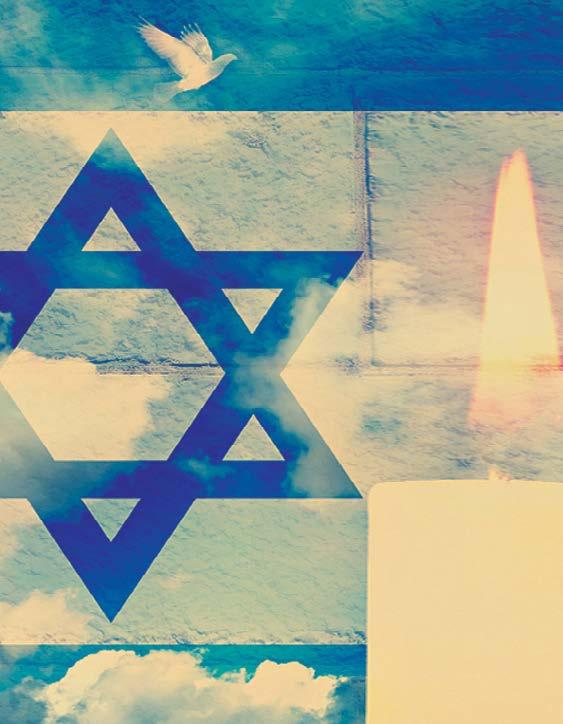
• To equip and teach the worldwide church regarding God’s purposes with Israel and the nations of the Middle East;
• To be an active voice of reconciliation between Jews, Christians, and Arabs, and to support the churches and congregations in the Holy Land.
From its head offices in Jerusalem, the ICEJ reaches out into more than 170 countries worldwide, with branch offices in over 90 nations.
Our vision is:
• To reach every segment of Israel’s society with a Christian testimony of comfort and love, and
• To reach and actively represent to Israel the support of denominations, churches, and believers from every nation on earth.
The Christian Embassy is a non-denominational faith-based ministry supported by the voluntary contributions of our partners and friends across the globe. We invite you to join with us as we minister to Israel and the Jewish people worldwide by donating to the ongoing work and witness of the ICEJ.


Dear friends,
Last month, the Anti-Defamation League released a disturbing report about antisemitism, stating that the number of Americans who believe antisemitic tropes and conspiracy theories has doubled in just over three years. One statistic revealed 85 percent of Americans (as many as 285 million people in the United States) believe at least one anti-Jewish trope.
Those numbers are staggering—and in this month’s Word From Jerusalem magazine, Susan Michael teaches on this evil ideology. In her article “Warning Christians about Antisemitism,” Susan explores what antisemitism is and looks like in modern times and why Christians must participate in recognizing and eradicating it.
You’ll also read about the Abraham Accords, which went into effect in late 2020, and why Christians can trust the genuine spirit of reconciliation inherent in these joint normalization statements between Israel, the United Arab Emirates, and Bahrain.
And though much of the world has sadly become complacent regarding the war in Ukraine, you’ll read how the ICEJ has diligently continued to assist thousands of Jews—including the frail and the elderly—in making Aliyah to Israel.
We thank God for your continual partnership in loving and blessing God’s chosen people and look forward to what we do together, with His help, in 2023.
CREDITS

ICEJ President Dr. Jürgen Bühler
USA Director Susan Michael
VP International Affairs Dr. Mojmir Kallus
VP Finance David van der Walt
VP Operations Barry R. Denison
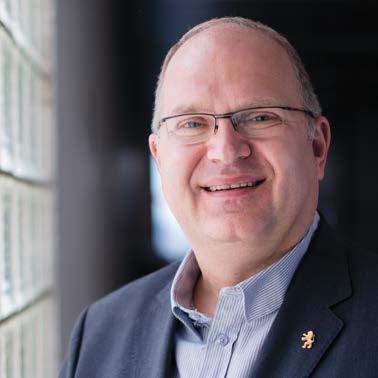
VP International Spokesman David Parsons
VP AID & Aliyah Nicole Yoder
Managing Editor/Publications Director Laurina Driesse
USA Managing Editor Karen Engle
Staff Writer Anastasiya Gooding
Graphic Design/Illustrators Ryan Tsuen, Peter Ecenroad, Nancy Schimp
Photography Shutterstock, Adobe Stock, ICEJ Staff and Branches, Wikimedia Commons, YouTube.com, Unsplash
The New King James Bible is used for all Bible references unless otherwise noted.
Word From Jerusalem is published by the International Christian Embassy Jerusalem. Reproduction in whole or in part without written permission is prohibited. Word From Jerusalem has no subscription price and is supported through contributions worldwide. The ICEJ USA Branch is a 501(c)(3) non-profit organization with offices in Tennessee, Florida, and Washington, DC. All gifts to this ministry are tax-deductible according to United States law.
INTERNATIONAL CHRISTIAN EMBASSY JERUSALEM - USA
Support our ministry online at: www.icejusa.org
Thank you for standing with us!
Dr. Jürgen Bühler
President
International Christian Embassy Jerusalem
COVER PHOTO: Part of the book cover designed by ICEJ’s Peter Ecenroad for Embassy Publisher’s newest release: Antisemitism: What Every Christian Needs to Know and How to Counter It
FOR MAGAZINE ARCHIVES visit www.icejusa.org/wfj
INTERNATIONAL CHRISTIAN EMBASSY JERUSALEM // FEBRUARY 2023 // USA EDITION WARNING CHRISTIANS AGAINST ANTISEMITISM WORD FROM JERUSALEM ••• ICEJ-ASSISTED RESCUE FLIGHT FROM UKRAINE (PAGE 14) ••• WORD FROM JERUSALEM
FROM THE PRESIDENT'S DESK
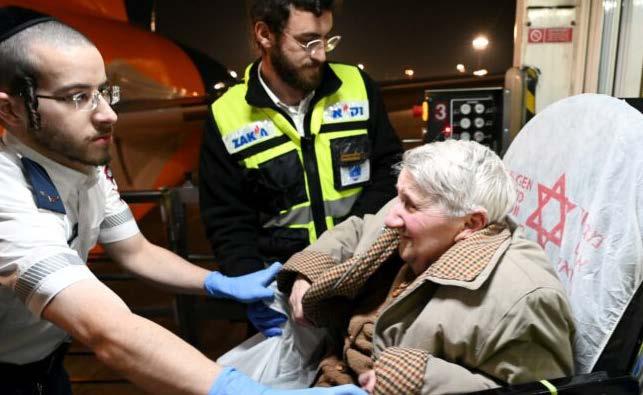


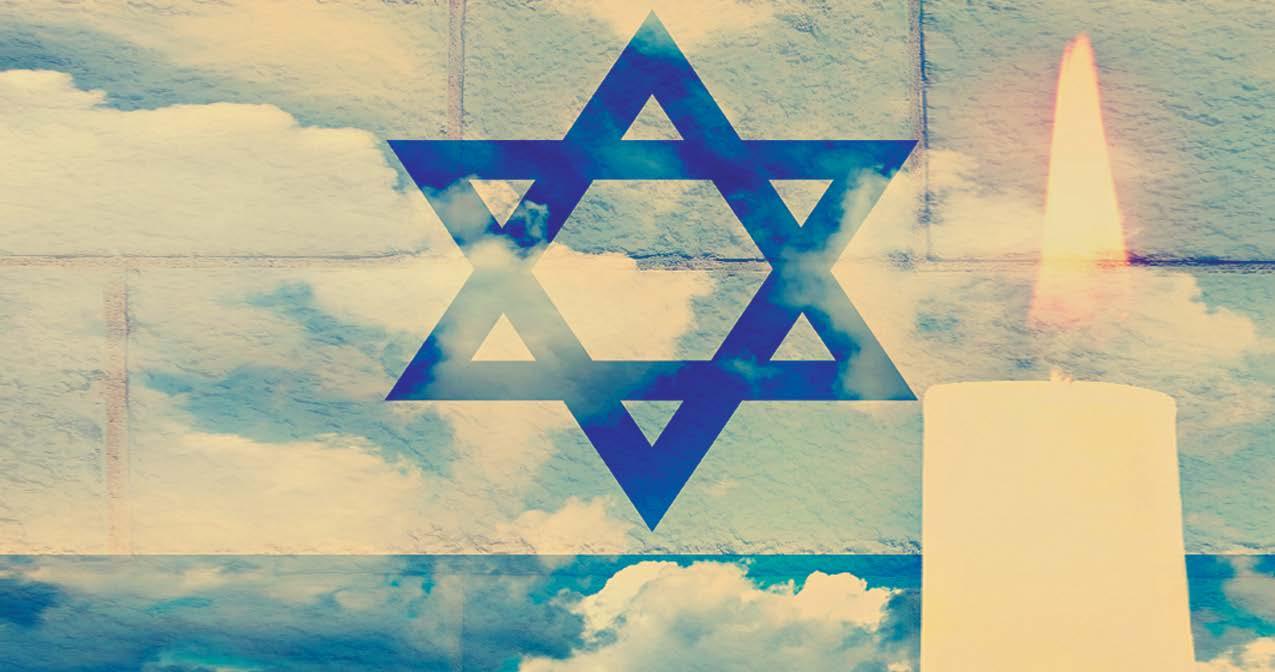

A SEASON OF RECONCILIATION 8 16 CONTENTS FEBRUARY 2023 USA EDITION 4 10 WOMEN’S ISRAEL EXPERIENCE WARNING CHRISTIANS ABOUT ANTISEMITISM ICEJ HELPS ISRAELI AT-RISK YOUTH DEVELOP NEW SKILLS 14 ICEJ-ASSISTED RESCUE FLIGHT FROM UKRAINE
Warning Christians about Antisemitism
B Y DR. SUSAN M. MICHAEL, ICEJ USA DIRECTOR
Many Christians involved in support of Israel may fail to recognize the amazing moment in history they are privileged to be a part of today. Only those who know the history of Jewish-Christian relations can appreciate the miraculous turnaround that has occurred in the last century. They will also understand the importance of learning from that past and guarding against the evil influences of antisemitism active in our day.
ANTISEMITISM IN CHURCH HISTORY

Persecution and animosity toward Jews began early in their history, long before Christianity. Pharaoh, Haman, and Antiochus Epiphanes are only a few examples of evil men who tried to destroy God’s chosen people. But while the Jews have had many enemies throughout history, Christians should be concerned about the part some of our forbearers played in this disturbing drama. The fact that persecution of the Jews rose from within our ranks is a tragedy and a shame the Christian community must deal with.
Jews and Christians had a tumultuous relationship in the first 100 years after the life and death of Jesus. At first it was an internal squabble between Jews who believed in His messiahship and Jews who did not. But religion in the Roman Empire had political ramifications. Judaism was legal, as was Christianity, when it was seen as a sect of the Jewish faith. But Christianity brought troubles to the Jewish community due to its allegiance to a King other than Caesar, so it was shunned and sometimes persecuted. Conversely, after the Jewish wars with Rome, it became dangerous for Christians to be associated with Judaism.
Another factor in the growing rift between the
two faiths was the result of the Roman siege of Jerusalem in AD 70. Jewish believers in Jesus had fled the city because Jesus had warned them to do so, as recorded in Matthew 24. But when they later returned to Jerusalem, they were resented and accused of being traitors.
T hen in AD 132, when the mainstream Jewish community looked for someone to lead a rebellion against the Romans, many joined Simon Bar Kokhba, proclaiming him as Messiah. But the Jews who believed in Jesus refused to join this rebellion, saying they already were following the Messiah. As a result, some were slaughtered as traitors during the fighting. This schism tore the two communities apart, marking the official split between the church and the synagogue.
At the same time, the church was becoming predominantly gentile. It was made up of pagans who had converted to Christianity with no knowledge of nor appreciation for the Jewish roots of the faith—or the Jewish people themselves. Several gentile church fathers began to distinguish Christianity by preaching against Judaism and warning their followers to stay away from it.
T he teaching of Replacement Theology (also called “supersessionism”) began to take root. Replacement Theology teaches that the Jews are cursed by God because of their rejection of Jesus’ messianic credentials, and the church has thus replaced the Jews in the plans and purposes of God. This theology led to a teaching of contempt for the Jews as “Christ-killers” and sanctioned their maltreatment.
Once Christianity became the state religion of the Roman Empire, the church became a tool
of the monarch and lost its spiritual integrity. Anti-Jewish theology paved the way for antiJewish legislation by the ruling powers, which included discrimination, persecution, forced conversions, ghettos, and expulsions.
Centuries of this type of religiously motivated and state empowered antisemitism prepared the way for the Nazi Holocaust. To paraphrase Raul Hillberg in The Destruction of the European Jews, the early church declared, “You have no right to live amongst us as Jews.” The secular rulers who followed that era expelled Jews from their lands or confined them to ghettos as though to say: “You have no right to live amongst us.” Then Hitler later decreed, “You have no right to live.”
T his is the deadly progression of antisemitism down through the ages. The fact that the Christian church had a role to play in this tragedy is a shame and something we all must come to terms with as Christians.
THE SHIFT
Today we are privileged to be part of a tectonic shift within Christianity away from that antisemitic past. There are three reasons for this change, the first dating back 400 years: the translation of the Bible into the common languages and its widespread availability through the printing press. For most of church history, ordinary Christians did not have access to the Bible to know what it taught, and tragically, some teachings about the Jewish people were not grounded in Scripture. Replacement Theology and the teaching of contempt for the Jewish people resulted and were the fertile ground for antisemitism that led to the persecution, expulsion, and even murder of Jews.
4 | FEBRUARY 2023
ICEJ TEACHING
However, as soon as Christians could read Scripture for themselves, many discovered the error of their ways. They realized that Jesus was Jewish and that Christianity had been born out of Judaism. They also read the many promises of God to one day regather the Jewish people back to their ancient homeland. Preachers began to teach about that return, and they prayed for and supported it as an act of justice for a people who had suffered persecution for centuries.
Some of the greatest and most respected Evangelicals in history were what we would call Christian Zionists today: John and Charles Wesley, Charles Haddon Spurgeon, Bishop Ryle of Liverpool, Professor Jacob Janeway of the Scottish National Church, and many others. The only difference between them and today’s Christian Zionists is that they looked forward in hope to a future event; today’s Christian Zionists have witnessed the return of the Jews to their homeland and actively support a current reality.
Replacement Theology still exists, but the church has come a long way in its relations with the Jewish people.
In addition to the wide availability of the Scriptures, two other events over the last century brought about a significant change in Jewish-Christian relations. The first was the Holocaust, which shook the historic churches predominant in Europe. The Catholic Church reevaluated its theology and liturgy. In fact, some of the most beautiful words ever written about Christian repentance toward the Jewish people were authored by Catholic bishops of Europe. The Lutheran church disavowed the antisemitic writings of its founder.
A second event, however, had more impact on the Evangelical world—the birth of the State of Israel. Since then, millions of Christians have visited Israel to “walk where Jesus walked,” and while there, many met a Jewish person for the first time. They witnessed a vibrant Jewish faith and recognized the modern state as a miraculous fulfillment of prophecy. It is no coincidence that as Christian tourism to Israel has mushroomed over the past four decades, Jewish-Christian relations have also.
Evangelicals emphasize the authority of Scripture and are a more Bible-based faith. They are now reading their Bible with a
new worldview—the Jewish people have been gathered from the north, south, east, and west, returning to their homeland in fulfillment of God’s promises to Abraham and confirmed by the Hebrew prophets. Christians are no longer looking down on the Jewish people and heaping condemnation on them. Instead, they are loving, comforting, and blessing them.
More and more Christians are honoring and exploring the Jewish roots of Christianity to learn more about their own faith. The fact that God is faithful and is fulfilling His promises to the Jewish people is an encouragement to Christians that we serve a faithful God who is true to His Word. As a result, the fastest growing segment of Christianity—Bible-based Evangelicalism—is largely pro-Israel.
The ICEJ Making History
With this history in mind, it’s easy to understand why the birth of the International Christian Embassy Jerusalem (ICEJ) in 1980 was such a historic, groundbreaking moment. It was the first time Christians voiced support for Israel on an international scale and from the heart of the newborn State of Israel. While some segments of the Jewish community were understandably skeptical, the ICEJ has now become a proven friend after four decades of acts of support and compassion.
We cannot change 2,000 years of history overnight. But the ICEJ has had the privilege of confronting this history and establishing a new relationship with the Jewish people. The ICEJ’s partnership with Yad Vashem (the World Holocaust Remembrance Center) is proof of this new relationship. The Christian Friends of Yad Vashem is taking Holocaust awareness to Christian churches around the world, teaching them about antisemitism in our day—and how to stand against it.
MODERN CHALLENGES
Most Christians today would never condone the religious antisemitism that fueled centuries of discrimination, persecution, ghettos, and exiles in the heart of Christian Europe, nor the racial antisemitism Hitler embraced that led to the horrific genocide campaign known as the Holocaust. There is no turning back.
However, there is a reason why historian Robert Wistrich calls antisemitism “the longest hatred.” This evil pursuit of the Jewish people has continued for millennia, and every time it
seems to be dying out, it reinvents itself with a different look and name. The goal, however, is always the same: to rid the world of the Jewish people.
The New Antisemitism
T he new form of antisemitism challenging our world is political antisemitism. Since a Jewish nation-state is antithetical to the ruling philosophies of our day—globalism and secularism—this modern form of political antisemitism is finding largescale acceptance today. It is directed not at individual Jews but against the Jewish state and is called anti-Zionism.
Religious antisemitism still exists, but this time, it is found throughout the Muslim world and is responsible for the genocidal rhetoric emanating from jihadist groups and the clerical regime in Iran. Muslim antisemitism, however, is tolerated by anti-Zionist Western leaders who blame its spread on Israeli policies.
Not all criticism of Israel can be considered antisemitic. However, criticism of Israel becomes antisemitic when it:
• Delegitimizes the State and questions its right to exist
• Uses anti-Jewish rhetoric and stereotypes
• Judges Israel by a different standard than any other nation
• Becomes an excuse to attack local Jewish individuals and institutions
T his new antisemitism, while rife in the Middle East and Europe, is seeping into America—including Christian churches. Some mainline denominations in America have passed anti-Israel resolutions based on lies of the delegitimization campaign. Denominations that previously denounced classical antisemitism have failed to recognize that the anti-Zionist campaign demonizing Israel is also antisemitic.
One cannot demonize a nation without demonizing the people, and the Israeli people are a subset of the Jewish world. As a result, anti-Zionism endangers Jews in other parts of the world. For example, Jews in Paris or New York have been attacked in the streets when Israel takes defensive actions in Gaza.
5 |WORD FROM JERUSALEM ICEJ TEACHING
Within Evangelical ranks, there are attempts to “correct” the pro-Israel movement within Evangelical Christianity by entertaining an anti-Israel narrative under the banner of “love and peace” for all! One such attempt used the motto “pro-Israel, pro-Palestine, propeace, and pro-justice.” What does it mean for an Evangelical to be pro-Palestine? The Palestinian Authority is a corrupt government that discriminates against Christians, jails and tortures Muslim converts to Christianity, honors terrorists, restricts freedom of speech, and fosters incitement in the public square based on lies about Israel. Is this really what the pro-Palestine Evangelicals are supporting?
In 2011 two ethics professors from leading Christian universities issued a scathing “Open Letter to America’s Christian Zionists” in which they accused Christian Zionists of sin for supporting Israel and encouraging Israel’s sinful policies. They went so far as to say that should “some nation” become “inflamed with resentment” at Israel and “make their land desolate” (noting what sounded like a “nuclear attack”), Christian Zionists would bear part of the responsibility.
T he ICEJ issued a strong response, and because of the growing influence of these voices, we built an educational website to defend Israel—and Christian support of Israel—www.IsraelAnswers.com. The purpose of IsraelAnswers.com is to equip Christians to articulate a defense of Israel and Christian Zionism as well as understand modern forms of antisemitism.
But more than respond, we need to close the door to antisemitism altogether. Disturbingly, the Christian church in America has left two doors open to this deadly influence.
Rise in Replacement Theology
Replacement Theology is gaining traction in Christian circles today under various names and guises, one of which is Fulfillment Theology. Jesus said He did not come to abolish the law but to fulfill it. However, Fulfillment Theology maintains that Jesus did abolish the law and, with it, God’s covenantal relationship with Israel. It also teaches that all the Old Testament promises to Israel are fulfilled in Jesus and the church; thus, they are no longer valid regarding modern Israel. Fulfillment Theology winds up in the same
place as Replacement Theology—namely, that God is finished with Israel.
It is important to clarify that just because someone holds a form of Replacement or Fulfillment Theology does not mean they are antisemitic. Many pastors hold replacement views as a theological assumption based on the lack of teaching in seminaries on Israel and the Jewish people. They begin ministry believing Israel and the Jewish people are irrelevant—God is only working through the church today. I call this “default Replacement Theology” because they were simply not taught otherwise. They would never condone the type of antisemitic preaching of the past that called for the persecution and demonization of the Jews.
Nevertheless, this theology does make one vulnerable. If you believe the Jews were so bad they lost their standing with God, you might believe the antisemitic tropes of your day. Replacement Theology is the theological foundation from which historical Christian antisemitism sprouted. Many scholars agree that the Holocaust could never have happened had it not been for the centuries of Christian antisemitism rooted in this theology. We must therefore be deeply concerned about its growth and learn to refute it.
Growing Biblical Illiteracy in America
A nother open door leaving the church vulnerable to antisemitic teachings is the loss of biblical literacy in America. Some mainline denominations have denied the authority of the Bible altogether. They use it more as a devotional resource with wisdom for everyday life and not as absolute truth. These denominations are in rapid decline because they practice a religion that is not faithful to its founding truths.
A core tenet of Evangelicalism is its belief in “Scripture alone” as the infallible source of doctrinal truth. While Evangelical Christianity, and its inherent support for Israel, is mushrooming in Asia, Africa, and Latin America, it has plateaued in the United States (and Europe) and is losing its momentum. This is evident in the growing biblical illiteracy in society, not to mention prominent Evangelical voices challenging core biblical tenets— including the definition of marriage, the nature of human sexuality, and the sanctity of life.
Across America, pastors and ministers are
confronted by a widening chasm of biblical illiteracy, contributing to the societal and moral breakdown engulfing families in their churches. They struggle to know how to instill a conviction of the Bible’s truth and power to a biblically illiterate generation.
Israel is the greatest single antidote to biblical illiteracy. It is, in many ways, the “answer key” that helps the rest of Scripture make sense in its proper context. We have found that once a Christian understands the biblical significance of Israel and the Jewish people, they “get” the entire Bible. Thus, the ministry of the ICEJ exists not just to bless Israel but help the worldwide body of Christ come to a greater understanding of this unique land and people and, through them, the very Scriptures themselves.
GOALS OF ANTISEMITISM
You and I are part of a historic shift in Christianity. The largest segment of the Christian world, the Catholic Church, has embraced the validity of the Jewish faith. The Evangelical world—the second largest segment of Christianity projected to one day be the largest based on current growth rates—has embraced not only the Jewish people but also the State of Israel. I am hopeful that the bulk of Christianity will never return to its antisemitic past.
However, we must understand how vulnerable we are and learn to recognize and stand against the antisemitism of our day. The current political form, anti-Zionism, seeks to rid the world of the influence of the Jewish people by challenging their right to be a nation. At its worst, this new brand of antisemitism condones the mass annihilation of Jews in their restored homeland.
Antisemitism’s goal in the modern Christian world is to rob Christians of the root that sustains our faith. The return of the Jewish people to their ancient homeland promised to Abraham demonstrates the truth of the Bible and God’s faithfulness to keep His word. As the apostle Paul said, the Jewish faith is the root that supports us. To be separated from that root means spiritual death.
T herefore, the battle against this evil ideology is our battle. It behooves us to do everything we can to help churches recognize it for what it is and stand against it.
6 | FEBRUARY 2023
ICEJ AID TEACHING
Antisemitism, the Church, and Anti-Israel Sentiment
 B Y TRICIA MILLER, P h D , ICEJ USA EDUCATION COORDINATOR
B Y TRICIA MILLER, P h D , ICEJ USA EDUCATION COORDINATOR
Antisemitism—opposition and hostility toward Jews— has existed in the church for almost 2,000 years. This ancient hatred includes delegitimizing, demonizing, and dehumanizing Jews individually and as a group. We can surmise from the apostle Paul’s instruction concerning the correct Christian understanding of God’s heart for His people in Romans 9–11 that Christian animosity and contempt toward Jews was present in first-century Rome.

Unfortunately, Paul’s teaching on this subject has been largely ignored throughout church history, and the false doctrine of Replacement Theology—which originated in the early church—continues to feed Christian antisemitism and anti-Israel sentiment through the assertion that Christians and the church have replaced Jews and Israel in the purposes of God.
Historically, whenever Replacement Theology prevailed, it resulted in overt anti-Jewish expression, often followed by violent actions against Jews. Today when Christian antisemitism manifests, it not only results in contempt toward Jews but in anti-Israel sentiment as well.
O pposition toward the Jewish people and Jewish State is actually a blatant demonstration of opposition to God and His decision to choose a particular people for a unique purpose. Zechariah 2:8 says, “He who touches you [Israel] touches the apple of His eye.” In other words, those who oppose Israel are poking God in the eye.
In addition to opposing God, Christian antisemitism and anti-Israel sentiment demonstrate a lack of understanding and/ or rejection of the eternal covenant God
made with Abraham and his descendants.
In Genesis 12:1–3, God told Abraham to leave his country and go to a land He would show him—where he would be blessed and become a great nation. God called Abraham to a specific land, and land is an integral part of the promise and subsequent covenant.
After Abraham arrived in the land, God said: “Lift your eyes now and look from the place where you are—northward, southward, eastward, and westward; for all the land which you see I give to you and your descendants forever” (Genesis 13:14–15, emphasis added). All the land Abraham could see was given to him and his descendants as an eternal possession.
In Genesis 17:7–8, God declared: “And I will establish My covenant between Me and you and your descendants after you in their generations, for an everlasting covenant, to be God to you and your descendants after you. Also, I give to you and your descendants after you the land in which you are a stranger, all the land of Canaan, as an everlasting possession; and I will be their God.”
All three of these texts emphasize the promise of a specific land. And when God established the covenant with Abraham and his descendants—including the promise of that land—He called it an everlasting covenant.
I n these perilous times in which we live, where antisemitism and anti-Israel sentiment are on the rise—even in the church—may we as Christians be grounded in the truth of God’s Word and emboldened to stand with the people and land with whom God made an eternal covenant.
7 |WORD FROM JERUSALEM GET SUSAN’S LATEST eBOOK ANTISEMITISM: What Every Christian Needs to Know and How to Counter It ICEJ TEACHING AVAILABLE NOW ON AMAZON OR THE ICEJ STORE WWW.ICEJ.STORE
A Season of Reconciliation
 B Y DAVID PARSONS, ICEJ VICE PRESIDENT & SENIOR SPOKESMAN
B Y DAVID PARSONS, ICEJ VICE PRESIDENT & SENIOR SPOKESMAN
In December 1995, I had come to Jerusalem to help the Christian Embassy prepare for an upcoming Christian Zionist Congress. At that time, the Israeli government was implementing the second phase of the Oslo Accords. In the first stage, Gaza and Jericho had been handed over to the Palestinian Liberation Organization (PLO) as a test case of whether Oslo could bring peace to the Land of Israel. Now it was time to cede more of the main Palestinian cities in Judea/Samaria (the “West Bank”), and since Christmas was drawing near, the spotlight was squarely on Bethlehem.
O n December 22 the Israeli Defense Forces (IDF) vacated Bethlehem, and Yasser Arafat flew in on a helicopter and landed late afternoon on top of the former British police station overlooking Manger Square. He then delivered a fiery antiIsrael speech and broadly smiled as the crowd below chanted “a million martyrs marching to Jerusalem.” This was the Palestinian rallying cry of those days— and every Israeli knew the word “martyr,” or shaheed in Arabic, referred to Muslims who die while waging holy war.
As the sun set, I went to a hillside and looked across Shepherd’s Field at the skyline of Bethlehem against the darkening sky. The circus had come to town, as a large, brightly lit Ferris wheel turned in the distance and fireworks burst overhead. Christmas in the birthplace of Jesus had been turned into a triumphant celebration of Palestinian nationalism.
From that moment, I could not escape the sense that Oslo was truly a false promise of peace. Phony! Contrived! And imposed from
“Now all things are of God, who has reconciled us to Himself through Jesus Christ, and has given us the ministry of reconciliation, that is, that God was in Christ reconciling the world to Himself, not imputing their trespasses to them, and has committed to us the word of reconciliation.” (2 Corinthians 5:18–19)
8 | FEBRUARY 2023 ICEJ AID ICEJ COMMENTARY
The Reconciliation of Jacob and Esau, as in Genesis 33 by Peter Paul Rubens, 1624; commons.wikimedia.org
abroad, which sadly, proved to be the case.
In contrast, there seems to be a very different dynamic today with the Abraham Accords. This historic move toward reconciliation and peace between Israel and a new tier of Arab neighbors may have been sealed two years ago with the help of US President Donald Trump, but it began many years earlier in the quiet trade ties Jerusalem established with the United Arab Emirates and Bahrain. And it was further nurtured by Israeli leader Benjamin Netanyahu’s visit to Washington in 2015 when he defied an American president by standing before Congress to voice his opposition to the pending Iranian nuclear deal. Many Arab Gulf rulers felt he was speaking on their behalf as well, as they, too, were feeling abandoned amid the Obama administration’s continual courting of the ayatollahs in Tehran.
Now it is true that the Abraham Accords are being driven on both sides by strong economic interests and by the common threat posed by Iran. And there are reasons to be cautious with any man-made deals. But I also believe there is something truly genuine and positive at work in the hearts and mindsets of those embracing this normalization process.
Even the name of the Abraham Accords is a tacit acknowledgement that the Jewish and Arab peoples of this region have a common ancestry in the patriarch Abraham. The Accords carry a message to the Jewish people that they are indigenous to this region and have come home to help build its future. This is music to the ears of so many Israelis today. It also is the
realization of the quest of Chaim Weizmann, the successor to Theodor Herzl as leader of the early Zionist movement, who sought to forge an agreement with the Hashemite Arab rulers of his day along these very same lines.
As a result, Israelis are flocking to Dubai and Abu Dhabi to shop and dine, and they are being warmly welcomed. Israeli tourism to Morocco is also sharply on the rise, and many Israelis were even flying the Moroccan flag over recent weeks in support of their soccer team’s surprising run in the World Cup. This is the sort of peopleto-people contact and peace that many Israelis longed for over past decades with Egypt, and indeed even Jerusalem’s relations with Cairo are warming in the wake of the Abraham Accords.
I believe we are in a season when Israel’s many Christian friends can trust the genuine spirit of reconciliation inherent in the Abraham Accords. It was Evangelical leaders who assisted in birthing the Accords with their visits to meet with regional Arab rulers, helping them to connect more closely to the Trump administration and the thought of normalization with Israel. So we should be praying and working ourselves to reconcile Jews and Israel with the Arabs and their respective nations. And we should be guarding against any effort by the US State Department or European Union to steer the Abraham Accords back toward the flawed twostate solution.
T here also is a remarkable spiritual dynamic at work today in the growing fellowship between Jewish and Arab believers in Yeshua. They are worshiping and praying together as never before
in history. An ICEJ leadership delegation just had a wonderful encounter in Cyprus with some 70 Arab Christian leaders from around the region, and this again demonstrated that God is at work to reconcile all things in Messiah.
I believe this is a day for Christians who love and support Israel to be reconcilers and not just partisans for one side of this conflict. We must continue to stand with Israel and defend her from her sworn enemies. But we also should be looking for opportunities to reconcile Jews and Arabs whenever possible.
In a recent Torah portion, we read in Genesis about the incredible moment of reconciliation between Jacob and Esau. Jacob was still afraid of his brother. He wrestled all night with an angelic being (Hosea 12:4). He divided his camp into thirds, with Rachel and Benjamin protected in the rear. And then Jacob saw Esau and his 400 men coming in the distance, and he anxiously bowed seven times to the ground. Yet then we read:

But Esau ran to meet him, and embraced him, and fell on his neck and kissed him, and they wept. (Genesis 33:4)
T his is an incredible prophetic picture of what the Lord can and wants to do between brothers once separated by jealousy and hate. May we see it in our day, and may we be instruments of reconciliation to help make it happen, just as God reconciled us to Himself through the amazing gift of Jesus from above.
TO OUT OF ZION PODCASTS
SUBSCRIBE
GO TO: www.icejusa.org/Shabbat-Shalom
and enjoy a short devotional every Friday based on that week’s Torah portion that will bring inspiration and peace to the close of your busy week.
9 | WORD FROM JERUSALEM ICEJ COMMENTARY
WOMEN’S ISRAEL EXPERIENCE FOREVER ETCHED IN OUR HEARTS



In May 2016 I graduated from seminary with a Master of Theological Studies degree. It had been an intense three years of juggling my coursework while raising two young daughters with my husband, who had a demanding career of his own. After throwing my cap into the air and hanging my diploma on the wall, my supportive husband said, “You should take a trip to Israel. After your studies, it will make the Bible come alive!”
He needn’t say more. I quickly began to search for a trip to the Holy Land that would work for our schedules, knowing I would have go alone so that my husband could stay home to care for our girls. My first preference was a “women’s only” tour, as my focus is primarily women’s ministry; however, I couldn’t find one. Thankfully, a good friend of mine connected me with the ICEJ and I attended the Pastor’s Tour in November of that same year.
If you have been to Israel, you know that once you place your feet on that holy ground, you have a longing to return—a slight ache to go back and experience His presence all over again. And so, I did. But this time I returned with the focus of one day leading a tour for women so that they could experience the Bible come to life before their very eyes. It was a dream the Lord Himself placed in my heart, and even when COVID-19 reared its ugly head, I held out hope that in His timing, this dream would become a reality.

T his past November, ICEJ USA Director Susan Michael and I led a group of 35 women in what we called a “Women’s Israel Experience.” It was a tour highlighting the women of the Bible and what we can learn from them. We began the trip by ascending Mount Tabor, and while looking out over the Jezreel Valley, we remembered Deborah’s story and her courage to rise to the battle when no one else was willing to fight. We visited Nazareth Village and pondered the humility and sacrifice Mary was willing to undergo to bear the Son of God. We experienced the vastness of the Judean Hills and thought of Sarah and the part she played in birthing the nation of Israel. At Magdala, we recounted the faith of the woman with the issue of blood who, with one touch of Jesus’ cloak, was instantly healed. At each site we were challenged to put ourselves in the sandals of the women whom we learned from, and we allowed the same God who spoke to, healed, and loved them to speak to, heal, and love us these thousands of years later.
Yet the most impactful and cherished moments of our trip were walking where Jesus walked and worshiping Him for the God that He is. The Word made flesh who came to dwell among us was palpably present throughout the trip. At every twist and turn His Spirit was with us, drawing us into a deeper awareness and awakening of who He is. It truly was an “experience” that will forever be etched on the hearts of those who participated in the journey.
I was beyond grateful to see a dream that God gave me more than six years ago become such a beautiful reality. Witnessing the Bible come alive for these women was a gift I won’t soon forget, and I pray that the Lord allows the Women’s Israel Experience to continue. But for now, the question remains: Are you ready to let your faith come alive?
Tour Coordinator April Rogers baptizes women in the Jordan River
Women from the tour enjoy a meal in “Abraham’s Tent”
April teaching on the Women’s Israel Experience tour at Mount Tabor
Team Picture at Tel Dan
B Y APRIL ROGERS
ICEJ USA REPORT 10 | FEBRUARY 2023 ICEJ AID ICEJ USA REPORT
AUTHOR & SPEAKER, REFLECTING LIGHT MINISTRIES











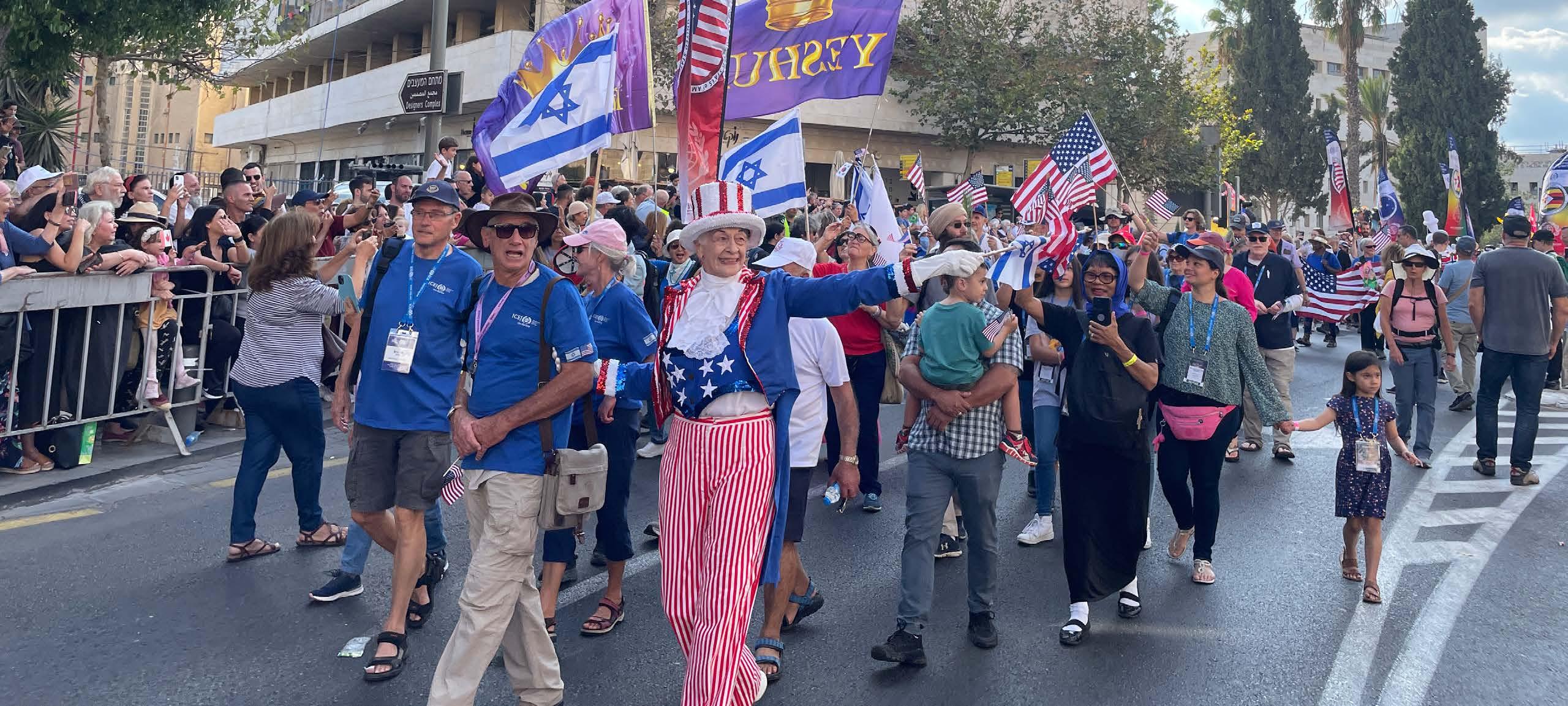





• King ofall the eart h • 29 September - 6 octob 2023 Stay tuned for more info on Land Packages and Online Feast packages! “ Fo r God is the King of all the earth Sing p r aises with understanding Ps a lm 47: 7 Plan to attend with the ICEJ USA Feast Tour 2023 www.icejusa.org/feast-tour JOIN US IN 2023!
ICEJ Gives Israeli Single Mothers New Confidence in Workplace
 B Y LAURINA DRIESSE, ICEJ MEDIA & PUBLICATIONS DIRECTOR
B Y LAURINA DRIESSE, ICEJ MEDIA & PUBLICATIONS DIRECTOR
Life sometimes takes unexpected turns— and for a young single mother, they can crush her dream of providing her children with all they need. Or they can cause an older mother to buckle under the reality of being alone in her 50s and struggling with a lowpaying job. Yet, there is hope!
Confidence is being restored to many single mothers across Israel who are currently on social welfare, unemployed, or earning less than 5,500 shekels ($1,580) per month. With the ICEJ’s support, many of these Israeli mothers from all backgrounds and cultures have participated in a vocational training program to lower the poverty rates for Israeli single mothers and low-income women struggling to provide for their children.
T he recruiting, screening, and mentoring process for participants to gain employment can take up to 12 months. Each course in the training program is taught by professionals and focuses on practical and theoretical studies. The courses are selected according to market needs so that when they finish the training, these moms will have marketable knowledge and skills.
Soft skills—like negotiating, writing a CV, time management, and preparing for interviews— are also offered in a special workshop at the end of the course. One recent course trained women to be insurance agents and gave them the certification required to enter the insurance field. ICEJ Vice President for AID and Aliyah Nicole Yoder was invited to take part in their graduation ceremony.
“It was a joy to hear from the women about
their hopes and dreams for the future,” shared Nicole. “I was able to congratulate them on their success and perseverance in completing a difficult course and let them know that we were excited about the new opportunities this certificate will offer them. I also was thrilled to let them know how the sponsorship came as a gift from Christians around the world who wished to strengthen them and their families. We are confident that they have a bright future ahead of them!”
Happy to see that most women successfully completed the Zoom course, the program’s instructor, Shimon, urged the women to be confident in what they learned, saying: “Step out! … When you enter the workforce, you’ll remember the material as you begin using it.”
He also encouraged them that the insurance industry has a shortage of workers in Israel right now.
“There is a lot of work. Companies are begging for workers. So it is a good time to look for work and get established. Jump in! Even in a parttime position. Often these positions become permanent. When you are in the water, you will learn to swim,” Shimon assured, adding that three of the new graduates had already secured employment in Jerusalem
One woman shared about her experience taking the course: “In the beginning, I was pretty skeptical, lacking in confidence and fearful,” remarked Shachaf. “I wasn’t sure that I would understand. I was afraid about going to work and not being able to be independent. In the end, I did understand and will be happy to continue in this field and on toward employment. I need
a change. I really enjoyed the course.”
Another woman named Vered said, “I liked that the course was only four months and felt that it was very focused and good. When Shimon started giving us questions for study and review, I found that very helpful. It was a lot of material, but the example questions helped me a lot. I liked that the course was focused—short and to the point!”
“I found the course interesting, intensive, and a challenge at a very high level. It helped me a lot,” shared a third participant, Yehudit. “Thank you for everything—and especially to the donors for this opportunity. It’s good to know that they are looking for workers with training. I’m about to have a baby, so I will have to wait a little before I can look for work. This course was better than I expected … I’m very happy that I had this opportunity.”
Meanwhile, Nicole spoke with Aviva, one of the first women to find work. Aviva shared how she had to give up the job because it was too far from her home, and she feared she would not measure up to working in a large office. This stress caused her to seek employment closer to home in a smaller office where she felt safer.
“For many of these women, it is a matter of gaining confidence, and I imagine that once [Aviva] proves to herself that she is able … she will move into other positions, which will be better paying,” assessed Nicole.
T hank you for your support in helping the ICEJ meet the needs of these struggling mothers as we seek to strengthen and support more disadvantaged families in Israel.
continue to give at: www.icejusa.org/aid 12 | FEBRUARY 2023 ICEJ AID ICEJ AID
Please
ICEJ Supports Aliyah Winter Camps for Ukrainian Jewish Youths

I CEJ STAFF WRITERS
The current major wave of Aliyah hitting Israel continues to roll into 2023. More than 73,000 Jews immigrated to Israel in 2022, the highest number since the years following the dissolution of the Soviet Union in 1989. The leading causes appear to be the direct and indirect results of the war in Ukraine. The ICEJ continues to help with this amazing ingathering in innovative ways, such as assisting with Aliyah winter camps for Ukrainian Jewish youth in the safety of nearby Baltic states.
Since the beginning of the Russia/Ukraine conflict in 2014, the ICEJ has sponsored flights, ground transportation, and Aliyah preparation activities, as well as immediate and urgent integration needs for thousands of Ukrainian Jewish Olim (immigrants) to Israel. Currently, we are helping to evacuate frail elderly Jews and assisting with youth Aliyah, especially for displaced families throughout the Former Soviet Union (FSU).
January 2023 started with the ICEJ supporting a wonderful, innovative Aliyah Winter Camp for young Ukrainian Jewish youths, ages 12–17, and Jewish children from the Baltic states. The atmosphere on the bus was cheerful as 54 youth from Ukraine, who had recently crossed the border into Poland and on to Riga, Latvia, joined 21 Ukrainian refugee children living in other East European countries and 45 Latvian Jewish children.
T he kids were so excited to stay in a three-star resort hotel. Soon the conference rooms turned into buzzing hives of activity as the youngsters
started making new friends, embracing their heritage, and learning all they could from Israeli counselors who taught them about making Aliyah and the opportunities awaiting them in Israel.
T he Aliyah winter camp was called “Dacha,” the popular Russian name for a country home where people often go for a rest during their summer or winter breaks. The winter respite usually runs from New Year’s Eve to January 10, when people often say: “I am going to my dacha.”
T hese Aliyah youth camps have been a huge success over the years, and this year was no different! Isaac, one camper from Lviv, expressed his opinion of the camp by showing a big “thumbs up” sign. Meanwhile, another youth from near Kyiv simply called it, “Super!”
“This is just one tangible example of the critical work for the Jews of Ukraine, made possible thanks to generous friends such as yourselves,” said Danielle Mor of the Jewish Agency, which organized the camp. “May [the year] 2023 be marked by such joy and hope.”
T his is the second Aliyah youth camp the ICEJ has recently supported in the Baltic region. The first such “Dacha” camp was in Lithuania in September for more than 100 children.
Most of the 73,000-plus Jewish Olim who arrived in Israel in 2022 were from Russia, Ukraine, and Belarus. However, there also has been a noticeable increase from other former
Soviet republics, such as Latvia, Lithuania, and Estonia. The ICEJ is well positioned to assist with this upsurge from the Baltic states as we continue to work closely with regional Jewish Agency representatives. For instance, the ICEJ is helping with Aliyah flights, airport transfers, Aliyah preparation seminars, and trips to the Israeli consul for visas.
On December 18 the ICEJ supported a special Hanukkah Day in Riga, Latvia, and our first sponsored flight was on the December 19. The first family was brought from a coastal city to the airport by van with extra baggage for the direct flight to Israel.
T he Jewish remnant in the FSU is concerned for their safety and future. They risk being conscripted for military service in Russia, while in Ukraine, men of draft age are restricted from leaving the country. This has led to the separation of family members, some of whom have gone to Israel; others have fled to East European countries. The ICEJ is helping in these situations with our integration programs and humanitarian help in the Diaspora.
We will continue to support Aliyah from the former Soviet republics. Our Aliyah work began in Vienna in 1980, and since then, we have helped more than 170,000 Jews come home to Israel—plus many more through the integration process.
T hank you for partnering with us in our Aliyah efforts to bring Jews back to their biblical homeland—the Land of Israel.
support this work by giving at: www.icejusa.org/aliyah 13 |WORD FROM JERUSALEM ICEJ ALIYAH & ABSORPTION
Please
ICEJ-Assisted Rescue Flight from Ukraine
Agroup of 100 frail, elderly Ukrainian Jews made Aliyah to Israel in December, landing safely at Ben Gurion Airport on the third night of Hanukkah. For some, Hanukkah candles were their only light source back in Ukraine; this year, the prayer said on the third night of Hanukkah was especially meaningful: “Blessed are you, Our God, Ruler of the Universe, who performed miracles for our ancestors in their days at this season.” These Olim experienced their own Hanukkah miracle, having just escaped the relentless bombing and power outages that resulted in widespread shortages of heat, light, and fresh water.
T his urgent rescue flight was made possible by the efforts of the Jewish Agency for Israel and the ZAKA1 emergency response team with substantial financial support from the International Christian Embassy Jerusalem (ICEJ) and several other organizations.

Seventy-six-year-old Ella Smirnova is completely paralyzed and, with help, left her home in Odessa while preparing for the Rosh Hashanah holiday in September: “I’m totally handicapped and limited to my bed, so this war has added to my feeling of helplessness, and I didn’t see a way out,” Ella said. “When the air raid sirens went off, the only thing I could think to do was try and hide under the bedsheets—the only way I would be able to save myself was if someone came along to help me,” she said.
Dovi Weissenstern, CEO of the ZAKA emergency response organization, told J-Wire Australian News: “This flight of 100 people evacuated from the war zone is very emotional, particularly in these days of Hanukkah, as it is a modern symbol of the heroism of the weak over the mighty.
“The sad reality is that most of the world has become complacent with the war in Ukraine, while our teams are still always working in the field in cooperation with other organizations. Every day we’re assisting Holocaust Survivors, the elderly, and people who have been injured in the shelling,” Weissenstern noted.

Ukrainian Prime Minister Denys Shmyhal said several energy facilities were damaged during what he said was the tenth such large-scale attack on his country. The eleventh such attack occurred on New Year’s Eve.
“Russia is trying to deprive Ukrainians of light before the New Year,” Shmyhal wrote in a Telegram post.

The ICEJ reacted immediately in the first days of the conflict to send a large donation to pay for the flights of more than 300 Olim. In 2022 the ICEJ supported the Aliyah rescue of 1,390 Olim from Ukraine, including nearly 400 frail, elderly seniors and, among them, some 200 Holocaust Survivors. Seventeen Holocaust Survivors have already been received in the ICEJ Haifa Home.
Israel’s ambassador to Ukraine told the Jerusalem Post he expects another wave of Aliyah in the winter as the war on infrastructure rages on.
14 | FEBRUARY 2023 ICEJ AID ICEJ ALIYAH & ABSORPTION
Give
gift now at:
1
Help us bring more vulnerable, frail, and elderly Jewish people home to Israel this winter.
your best
www.icejusa.org/Ukraine
ZAKA is the Hebrew acronym for Disaster Victim Identification.
Every Generation’s Story: 75 Years of American Christian Engagement with Israel follows the unique experiences of 18 American Christians representing 5 generations who responded to God’s call to go to Israel–and whose lives were changed forever because of it.
 —Dr. Marvin Wilson, author of Our Father Abraham: Jewish Roots of the Christian Faith
—Sarah Weiskopf, student at Grand Canyon University, Phoenix, AZ
—Dr. Marvin Wilson, author of Our Father Abraham: Jewish Roots of the Christian Faith
—Sarah Weiskopf, student at Grand Canyon University, Phoenix, AZ
As part of our ministry of blessing and comfort to Israel, the International Christian Embassy in Jerusalem (ICEJ) is thrilled to see disadvantaged children flourish in a loving and supportive environment that encourages their growth and development.

During Hanukkah in December, ICEJ Vice President for AID and Aliyah Nicole Yoder visited an Israeli youth village we support, home to 141 young kids. Most of these children are between 6 and 18 years old and have been removed from their homes for their well-being, though some children in the village can spend time at home with their families occasionally.
A small group of children participate in the youth village programs but still live at home. The hope is that with support, their families will be strengthened so that these children will not need to be removed.
T he youth village has embarked on an educational and therapeutic project to open a bakery operated by the children. An instructor familiar with working with at-risk children is teaching them life skills alongside learning to bake and cook. This initiative has proven to be immensely popular with the kids.
Anxious to start but with few resources to purchase essential equipment, a room was identified for the new bakery-to-be. The project kicked off with great enthusiasm with a few appliances, like used mixers, a second-hand oven, and a small refrigerator. However, more equipment is needed to turn this dream into a reality and get the project fully up and running.
“The ICEJ is so excited to support this initiative,” said Nicole. “Over the next few years, these at-risk children will build their skills and learn to develop business and marketing plans that will drive this initiative into becoming a real business in the community,” she explained.
During Hanukkah, baked treats are plentiful in Israel. So not surprisingly, the kids were excited to get out of school a few hours early to use their new skills and bake for the village Hanukkah party. Nicole witnessed a hive of activity as the joyful kids worked energetically to bake 170


ICEJ Helps Israeli At-Risk Youths Develop New Skills
B Y LAURINA DRIESSE ICEJ MEDIA & PUBLICATIONS DIRECTOR
delicious sufganiyot (doughnuts). Later, during the party, the proud bakers offered guests a selection of colorful toppings to give their taste buds a unique, flavorful treat!
T he whole village was abuzz as preparations for the Hanukkah party took shape. One young man who struggles with stuttering practiced a beautiful song to perform at the party. When he sings, the stuttering somehow fades into the background, and he can sing clearly and beautifully.
Meanwhile, guests were beginning to arrive at the front gate. Elevenyear-old Shlomi was alive with anticipation for the party, and even more so when he spotted his parents arriving. He called out to the director: “Maya, look! My mom and dad are here!”
“He looked like a pent-up bundle of emotion and energy, all wound up and so sweetly shy at the same time, as though he did not know exactly what to do with himself,” noted Nicole. “I was so touched to hear that the parents received a special taxi—paid for by the village—so that they could make it to the party. It was their first visit, although their son had lived in the village for four years. No wonder he was a bundle of pent-up emotion.”
T he director quickly suggested that he choose a gift for his mother from a nearby table. “You should have seen him shoot off at a run to get that gift for his mother. What a special day for him and so many other children who welcomed their parents to the village for Hanukkah,” said Nicole with much emotion.
Warm thanks to the ICEJ’s partners who gave the first donation toward purchasing equipment to get this project going. The donation will go toward purchasing an industrial oven.
Please consider giving to ICEJ AID, which helps disadvantaged Israelis have a brighter and more hopeful future—and in this case, is enabling at-risk Israeli youths to heal and develop new vocational skills in a loving and safe environment.

16 | FEBRUARY 2023
ICEJ AID Give at: www.icejusa.org/aid

Your Israel Answer

Why Is Israel So Controversial?
By Dr. Susan Michael, ICEJ USA Director
There are two competing views of Israel. The first is that the Jewish State is a miracle and cause for celebration. The second is that Israel is a calamity and should be exposed and opposed. How can there be two polar opposite opinions—and what makes Israel so controversial?
Fake News
Long before Trump came up with the term, Israel was the target of false news. As a young student in Israel in the 80s, this perplexed me. What was the truth? What I saw was so different from how the media portrayed Israel. We now call these lies “fake news.”
Two Faces of Arab Leaders
We also learned not to go by what the Arab leaders said to the Western world in English but what they said to their own people, especially in Arabic, because it differed significantly. One of the most wellknown examples is Yasser Arafat, head of the Palestine Liberation Organization (PLO), who in 1993 met with the prime minister of Israel at the White House, shook hands, and started what the West thought were steps toward peace with Israel. However, soon after, while he spoke in a mosque in Johannesburg, South Africa, a leaked recording of Arafat’s remarks to the Muslim faithful revealed his true intent:
The Jihad [Islamic holy war] will continue, and Jerusalem is not [only] for the Palestinian people, it is for all the Muslim nation. You are responsible for Palestine and for Jerusalem before me. . . . This agreement, I am not considering it more than the agreement which had been signed between our prophet Mohammed and Quraysh.
The agreement he referred to is well known within Islam. Mohammed had been unable to conquer Mecca, so he made a 10-year agreement with the ruling Quraysh tribe that allowed him to enter Mecca to pray. After just two years, he had built up his military forces enough to abrogate the agreement, slaughter the tribe of Quraysh, and conquer Mecca.
Arafat never intended to live in peace with Israel and used the peace
process for personal gain. Western leaders refused to believe he meant this and awarded him a Nobel Peace Prize. He later turned down all offers for peace and started the bloody Second Intifada.
Ruling Ideologies
Israel is also up against ruling ideologies in our world today, such as globalism, secularism, and moral relativism. Israel flies in the face of all three of these.
First, Israel is a nation-state based on nationalist aspirations of the nineteenth-century Zionist movement. Globalism wants to do away with national boundaries and depicts nationalism as being racist or divisive.
Second, Israel is a Jewish state created for the sovereignty and freedom of the Jewish people. Therefore, government holidays and societal norms are based on the Jewish religion. This flies in the face of the ruling ideology of secularism, whose proponents look down on a state that reflects the majority religion of its citizens.
Third, the world is increasingly relativistic in its morality. With moral relativism, there is no right and wrong, no truth and falsehood, no black and white—everything is grey and each person decides what is true or false, moral or immoral. The people of Israel gave the world the Bible and the 10 commandments upon which we base our system of jurisprudence. Moral relativists despise the Bible and the JudeoChristian ethos based upon it, insisting they are antiquated and bigoted.
Antisemitism
A global study of antisemitism conducted in 2014 determined that 25 percent of the world’s population holds antisemitic views. Of that 25 percent, an astounding 70 percent had never met a Jewish person proving the problem is one of propaganda, misinformation, and disinformation. Lies and conspiracy theories have destroyed the Jewish people’s reputation for 25 percent of the world’s population. It’s a global problem that can’t be solved overnight. The Jewish people cannot turn this situation around on their own and need our help to do so.
18 | NOVEMBER 2022 18 | NOVEMBER 2022 18 |WORD FROM JERUSALEM Learn more about Israel-related topics at: www.icejusa.org/israel-answers-series
Spiritual Warfare

Finally, Israel is fighting a spiritual war not easily understood. However, three verses in the Bible offer a clear biblical explanation for it. The first is Genesis 3:15, where the Lord says there will be enmity between the serpent and the woman until her seed crushes the head of the serpent. In the end, the Messiah will defeat evil, but first, spiritual forces will direct this enmity and hatred toward the woman.

The second is Psalm 83:1–4, which says God’s enemies are conniving to destroy His people Israel so that even their name will never be uttered again. This spiritual enmity against God and His people is reflected in military confrontations and governments.
The third reference to this spiritual war is found in the New Testament book of Revelation, chapter 12, in which Israel is described as a pregnant woman crowned by the sun, the moon, and 12 stars, which represents the 12 tribes of Israel. An evil dragon sits at her feet, waiting to devour the male child, and when he fails, comes after the woman. The age-old animosity of the serpent in Genesis is now depicted in the dragon.
Christians and Jews Together
Revelation 12 goes on to describe that when the dragon is unable to destroy the woman—the people of Israel—he goes after her “other offspring, those with the testimony of Jesus” (v. 17). The church was born out of the Jewish faith and people, and we, too, suffer in this spiritual fight. The evil pursuit is against the woman (Israel), her male child (the Messiah), and the woman’s other offspring (the church of Jesus Christ).
This helps explain the shocking hatred for Christianity in our days, particularly Bible-based, Evangelical Christianity. We, too, are being openly maligned, hated, and falsely accused by the proponents of globalism, secularism, and moral relativism.
We are in this together and must stand in solidarity with one another. Whereas the Jewish community may be small, Evangelical Christianity claims over 800 million worldwide. Many Christians pray for the peace of Jerusalem and seek to bless the Jewish people. However, more need to be educated and mobilized to speak out in opposition to these ideologies and bring an end to the controversy of Israel.
ON AMAZON OR AT THE ICEJ STORE AT: www.icejusa.org/product/encounter-the-3D-Bible














 B Y TRICIA MILLER, P h D , ICEJ USA EDUCATION COORDINATOR
B Y TRICIA MILLER, P h D , ICEJ USA EDUCATION COORDINATOR

 B Y DAVID PARSONS, ICEJ VICE PRESIDENT & SENIOR SPOKESMAN
B Y DAVID PARSONS, ICEJ VICE PRESIDENT & SENIOR SPOKESMAN






















 B Y LAURINA DRIESSE, ICEJ MEDIA & PUBLICATIONS DIRECTOR
B Y LAURINA DRIESSE, ICEJ MEDIA & PUBLICATIONS DIRECTOR




 —Dr. Marvin Wilson, author of Our Father Abraham: Jewish Roots of the Christian Faith
—Sarah Weiskopf, student at Grand Canyon University, Phoenix, AZ
—Dr. Marvin Wilson, author of Our Father Abraham: Jewish Roots of the Christian Faith
—Sarah Weiskopf, student at Grand Canyon University, Phoenix, AZ









